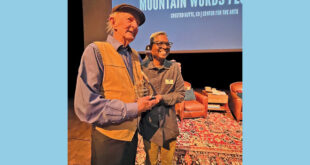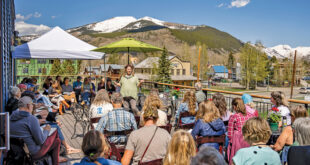The explorer and author is now based in CB in between cold weather travels
By Katherine Nettles
For Eric Larsen, the big news is not necessarily that his attempt to cross 700 miles from the north shore of Antarctica to the South Pole, along what is called the Hercules route, in a record solo time of 22 days in December 2018, did not work out.
The outcome is certainly of consequence, as is the main reason for his troubled traverse: He credits climate change for causing unprecedented warm, moist air flows and subsequent whiteout conditions for almost the entire trip.
Larsen’s December foray was his sixth to the region, and he says he had never seen anything quite like the weather he encountered. The expedition was titled Last South, because as Larsen has described it, the days of over-snow or ice travel to the South Pole are numbered. Larsen plans to write a book about this, which will be his third overall about his explorations and the climate changes he has witnessed first-hand.
Larsen talks openly about the impact of his expeditions in keeping him away from his wife, Maria, and two young children, and he says as his children get older he feels the weight of missing his family during his extended trips more sharply than he did before.
Perhaps the biggest news is that when Larsen is back home in Crested Butte, he is happy to just be here.
“Everyone always asks about what’s next,” he muses.
Of course, what comes next are more international expeditions to cold places, many of which he is commissioned to guide (including, yes, Antarctica). In 2018, before he left Crested Butte for his Last South attempt, he estimates that he had already spent about five months away doing other guiding trips.
“From an emotional standpoint, this trip was pretty hard for me, on a lot of levels,” he admits.
Reconsidering adventure
Larsen says of his various expeditions that Antarctica is not by any means the most physically challenging. “The North Pole is the hardest,” he says, in terms of snow and ice terrain challenges, in terms of rescue difficulties, and in terms of climate and exposure. “Antarctica is somewhat benign. There’s a pretty strong logistical network there nowadays,” he compares.
In fact, one of the men who attempted a similar record along the 540-mile Messner route in Antarctica immediately after Larsen’s Last South trip (and claimed a highly contested “success”) was a former client of Larsen’s, one who Larsen in large part taught and trained, based on his own collected experiences there.
When asked if it bothered him to see other competitors in the same region, attempting similar feats, and sometimes on his (figurative) heels, Larsen says, “I’m psyched to see that people are doing this sort of thing, in a lot of ways.”
But he does emphasize, repeatedly, that he wants people in positions like his to be honest about their achievements. This topic has been hot lately as some expeditions have claimed false victories, or exaggerated their progress across Antarctica. Larsen believes emphatically in representing the truth. “There is a need for some more integrity,” he says, among those who make claims of these achievements—especially to honor those who are honest about it, who have been injured trying, and some who have even died trying.
Larsen also expresses some hesitation about making a big fuss out of any of it, actually. “In sports… it feels like people get focused on these iconic trips,” he says. “For me, I’ve always felt that what I do is pretty arbitrary anyway.”
In his future Larsen is interested in more of what he calls state-a-thons—“border to border, human-powered, three-sport traverses.” He likes the idea that adventure is everywhere, and he has done recent trips and campaigns to draw attention to what is available in people’s own backyards, such as crossing a state from east to west, “or any direction, for that matter,” by foot, bike and canoe.
Larsen believes in cultivating the spirit of adventure, encouraging people to explore the rivers and woods nearest them—no matter how seemingly urban or lacking in wilderness it may be. While he thinks in many ways the age of exploration is over, “My goal is now to just find new ways to do things.”
Larsen insists he is a very average athlete, despite the evidence to the contrary, and that even by some measures his life could be considered boring. “I’m sort of doing the same stuff I was doing as a kid… the same stuff I’ve always done,” he says. He grew up in a small town of Cedarburg, Wisconsin, north of Milwaukee, where camping and being outside was just part of life.
“Our house was very singularly focused on nature,” Larsen says. His dad was the director of a nature center, and his daily activities were birding, fishing, canoeing, making maple syrup, collecting prairie seeds (to help re-establish native prairies), and a lot of biking. “The kids I went to preschool with, I graduated with,” he says. The activities he did as a kid, such as camping, biking and playing in the snow are still his focus, although he is now on a world stage.
He concedes the scale of his adventures has changed a bit. They now include world records, first ascents, and summiting Mt. Everest.
And maybe the first telltale sign that he takes big adventures in stride is when he recalls his childhood. “I got a bike, bought a map, and went out and did 60, 70, 80 miles,” he says simply. That was in eighth grade.
And while that isn’t quite what every 12-year-old in America is doing, Larsen seems wired to think that way. He has sponsors now, and relies on them to fund his expeditions, but he isn’t impressed with grandstanding, and says his wife is the real athlete in the family, with her own history as a D1 track star. “I would love to have even a fraction of her genetics,” he says.
The winding path to artic exploration
Larsen prefers not to play up any of his efforts beyond drawing attention to the environment from a stewardship perspective, or encouraging people to enjoy nature. He came by polar exploration in a roundabout way by trying many different ways of being paid, at least a little, to play outside and make an impact.
“For me, my path to expeditions wasn’t necessarily about, ‘Oh, I’m the most badass guy—how can I prove myself?’ It was, ‘How can I get people interested in these issues that I think are important?’” he says. “But money has never motivated me.”
Instead, there was a college bike club to join, a bike tour that needed a mechanic, or some other opportunity luring him to a new area. He followed a friend out west who was guiding whitewater canoe trips, and Larsen took the opportunity to start canoeing western rivers. He was a backcountry ranger in Alaska one summer, which he describes as being “the best summer of my life.” That led to other odd jobs, and eventually dog mushing in Minnesota—”the best f*#!ing winter of my life.”
Larsen recounts spending time in the Northwest Territories, working on his family’s tree farm and guiding people on canoe trips. But increasingly, he says, he was feeling frustrated with some of the trips he guided, especially when they were geared toward making adventure for other people more comfortable than might be truly necessary.
“I think there is value in less,” he says. He emphasizes that minimalism in the wilderness feels more important to him than coddling people.
He also wanted more of an educational element to his work with others. He wasn’t necessarily looking for money, he says, but something meaningful and steady had its appeal. He began creating outdoor curriculum for an environmental center and then as a base camp manager. He enjoyed using his degree in biology and environmental studies. But he still felt limited, and moved on a few years later. Around the age of 30, Larsen describes a time of self-doubt. “Other people around me were married, had kids, had jobs—and I was making less money than I had in high school,” he says.
Then something changed. He was invited to be a base camp manager for a four-month dog sledding expedition, then as a team member (he considered it more of an apprenticeship) on a trip to the North Pole, and then he partnered with Greenpeace. This all seems to have led the way to where he is now. “For the first time in my life, I felt like there was a community around me,” he says, “and that my skills had value.”
His expeditions have since landed him on the Tonight Show, on a TedX Talk, in magazines, and in a 2014 documentary about the North Pole titled Melting: Last Race to the Pole.
But even in the life of an elite, sponsored polar explorer, Larsen points out that “Nothing ever lasts.” Larsen’s successes on major expeditions, including his Three Poles trip in 2010, during which he became the first person to successfully set foot on the North Pole, the South Pole and the summit of Mt. Everest within one year, have also been punctuated by failures. He speaks of failed attempts like one in 2005 from Russia to the North Pole, and then in December.
“It’s hard for people to see all the failures anyone has,” he says. When it comes to many professional athletes, they of course train hard and fail many times until or unless they reach their goal. But, says Larsen, when it comes to major international expeditions that cost tens of thousands of dollars, it is harder to consider the attempts as part of the process.
“When you try to do different things that have uncertain outcomes,” he says, “it’s going to give you variable results.”
A changing outlook
His latest trip to Antarctica brought him very different results from those he had known in the past. “I used to not mind the uncertainty and stress,” he says.
His thoughts in the isolated, frozen desert of Antarctica went repeatedly back to Maria and to his kids, who were perhaps playing with the mission control station he made for them that sits in the family room. The family tracks Larsen’s progress during his journeys with maps, dials, charts, a video chat viewing station and a clock timer set to the zone where he is located on any given trip. Larsen has hoped this would help his kids feel connected to him. As he pulled his supply sled behind him, alone in a continuous white void, craning his neck to keep a read on his compass, his thoughts wandered back to what he might be missing at home in Crested Butte.
He says in between his trips, he has been having a blast just catching up with the kids. He has planted homemade ice globes on the front porch and adventured out with the family to ice skate, ski, ice fish and sled.
Larsen says his wheels are turning about how to stay closer to home more often. He is interested in teaching people regionally about winter camping. He has various state-a-thon ideas, “I would love to do them in every state.” His outreach on environmental issues continues, and through his taglines such as “being cold is cool’ to raise awareness of climate change. He admits that at the end of his trip, his initial feeling was that he might be done with these major expeditions. And now he isn’t exactly sure.
“I used to just be like, go at all costs. One of my old expedition partners [asked], ‘Eric, when is it going to be enough for you?’ And I was like, ‘Never.’” Now, says Larsen, maybe he is finding his stride in a different pace. He estimates that two thirds of his trips are now guiding, and he enjoys it more now—maybe because things are more on the terms he believes in. His personal trips are a little easier to come by logistically, since he has one- to two-year sponsors and partnerships.
During his Last South expedition, Larsen wrote a blog post almost daily. As he faced the inevitable defeat of his mission due to weather, he wrote, “I am a firm believer in failing forward. To me any great undertaking is a process, not a singular destination, and I have come up short on grand adventures many, many times before (it never gets easier). The insights gained here and now will, in the not so distant future, provide valuable insights into overcoming the next difficulty I encounter.
“For much of my life, I have never really felt ‘comfortable’ in my place in the world, but for the first time now feel that I have a home which completely overshadows any expedition—successful or not,” he continued.
From the comfort of his family room, as snow falls gently outside and his library of polar exploration books sits within reach, Larsen says he has been “pretty psyched to not do anything.”
That seems like a fleeting thing, considering his schedule.
Having soaked in a few weeks of downtime in between trips like his December expedition, his January trip to Canada leading a Level I polar training course near Lake Winnipeg, he is now leaving next week for the North Pole where he will guide a “Last Degree” skiing expedition from the 89th parallel. But, he says, “I love being in Crested Butte…and right now, I am pretty happy to just be here.”
 The Crested Butte News Serving the Gunnison Valley since 1999
The Crested Butte News Serving the Gunnison Valley since 1999





